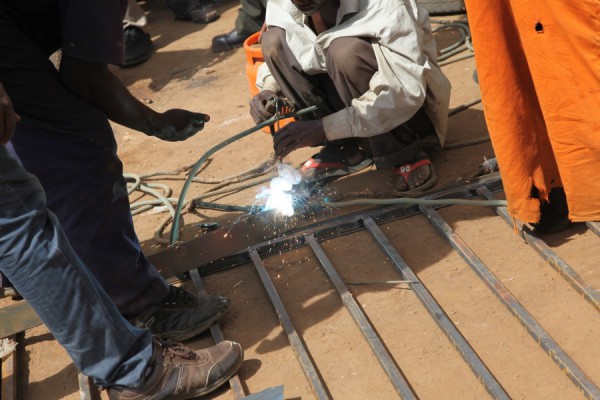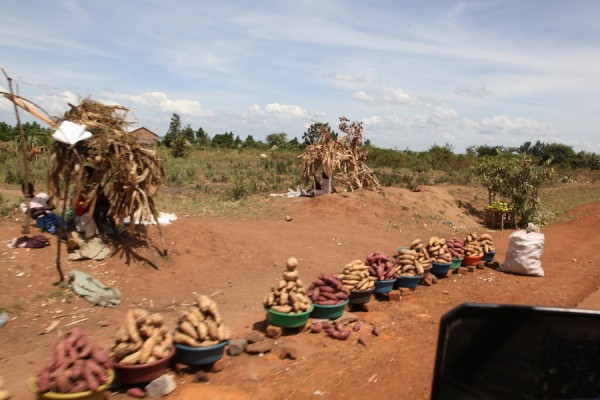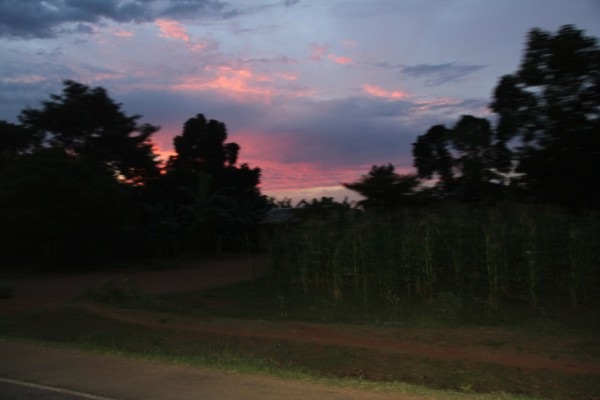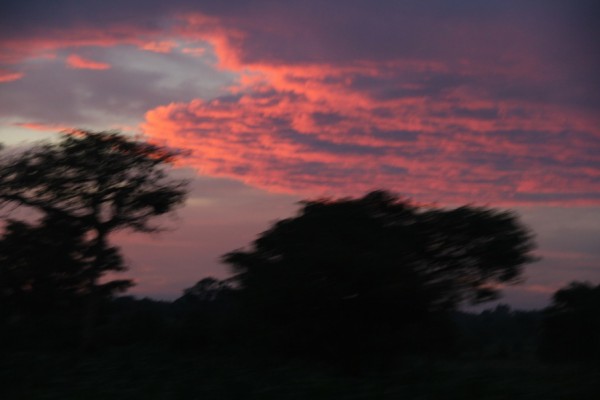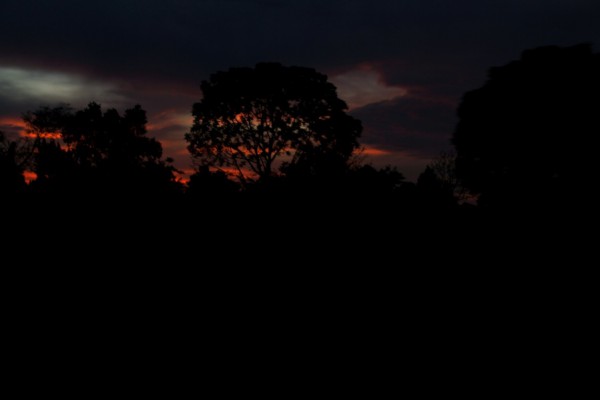Today was a tale of two halves. This is the sad second half. We left you waxing poetically about Macedonia (the band, not the place) and the way music saved dozens of lives as the village managed to survive occupation by the rebels and reoccupation by the government.
We then hinted at problems. Rather than leave at 13:00 to travel to Kampala, we were forced back to Soroti with a broken wheel and only managed to hit the road again at 15:30. So we knew we were in for one of those ‘African Night Drives’ we so often do and so often swear we’ll never do again.
We’ve decided night driving in Africa is like child birth. While you’re in the throws of it, you’re swearing to the lord almighty that you won’t go through this again. And then you find yourself right back at it. Well, we’re going for one big happy family because we did it again. (As this blog has been edited with the team, there has been a strong attempt by our female members to point out that our male members have no right to equate anything to child birth. But we read, people. We do read.)
While much of our Ugandan driving has been fascinating, there haven’t been that many changes along an ‘average roadside.’ The biggest change, and we’ve become quite obsessed by this for some reason, is the hats placed on the white charcoal bags. (Others would like to add that it’s just Jimmy who’s obsessed with the charcoal bags).
For most of the places, folks just want to keep the charcoal dry. A good handful of grass is enough and you get the nun look with the green crown. But around Soroti, they take this hat stuff seriously and the charcoal is covered with a beautiful crown of woven straw. It goes beyond function. These guys want their nuns properly helmeted. As we travel east, we seem to have found a compromise between the two – a little weaving but very utilitarian.
The other big change is the arrival of potatoes. We are in potato country now and the roadsides are covered with them. Otherwise, the same road rules apply so we won’t repeat ourselves.
We suppose a description of inside the car is overdue. So let’s get the basics out of the way. Some of us sleep. Some of us put on our iPods and drift off to a faraway place, usually not involving an African road at night. But we are also fully-fledged members of the always on everywhere generation. So Steve is generally reviewing logistics for the next day. Things always go wrong and he is always in recovery mode – something he does exceptionally well. The rest of us are always in full time ‘back up’ mode, shifting camera cards to hard drives and backing up hard drives.
And as we write this, at about 18.44, we are looking at the most spectacular African sunset to our right. We must be heading south right now and we must be being rewarded for bringing the story of Macedonia to you. You’re most welcome.
But we digress. A group of us is in file management mode and this is worth a brief discussion (well, mostly because we are driving on the road in pitch black to Kampala and are using this blog to distract ourselves from the terrors occurring outside!).
Behind the scenes, Singing Wells is all about finding the right 3 or 4 repeatable models that will drive our success. If we can get into the right routines, we can learn more and more from each trip and get better and better. For the March Pilot in 2011, simply getting audio equipment to work in the field was the most important routine. Don’t underestimate the learning required to set up 8 mic recording session in the dirt, surrounded by cows. By Kisoro and the recording of the Batwa, audio was fully sorted and the team could set up and breakdown in about 20 minutes and record flawlessly.
The next big mission was video. We had to discover what everyone else knew before us, that to be able to work quickly after a take to edit between three cameras, we needed to have all three cameras and audio start recording to a clapper board and keep recording through the whole take. We learned to get all the computer and cameras on the same time signature. We learned the roles of each camera (1 is stationary, full group, 2 is politely called fingers/feet and faces and 3 is context and overcoming the weaknesses of 1 and 2’s position). We even sorted out after a while how to stop the groups from starting the song while our poor clapper board person (Nick) was still running from the shot.
Third, we then had to sort out interviews and research. We’re really good now at doing interviews on songs, villages and groups and supporting that with research. This all sounds like pretty basic things and we agree. But imagine arriving at a village that has 6 groups, no clear leaders, no common language, and no particular interest in telling their story unless asked. You’ve got to sort this out pretty quick and get the right person talking about the right issues. But we’re doing well now.
Then there’s file management. We need outstanding file management for 5 reasons. First, we need to make sure everything is backed up often and twice. We’re in harsh environments, recording through dust and rain, bouncing along rough roads (we are reminded of this fact because as we typed about dust and rain we were travelling slowly but dramatically through a pot hole the size of Rhode Island), with equipment going through 1.5 gigs of data A DAY. Second, we need an exact record of the day, linking files to songs and songs to groups and groups to sites and sites to days. We average about 20 songs a site and just over 1.5 sites per day. Just getting the right spelling on to a clapper board of a song and getting that recorded elsewhere against a take list takes time to master. Third, we then need to very quickly produce 3 camera videos. So during our car rides, we’re linking a group and song to the ‘bounce’ (final audio) and the three videos used in that take. Time signatures are vital here and as we keep our take list, we keep a record of when the videos stopped and started so we can recover quickly. Fourthly, we need to run our blogs and Facebook entries ‘live’ during our trips, when we get the most interest in Singing Wells. This requires the refilling of all photos to groups and villages so these can be used in different file sizes for ‘road posts’, formal trip reports and then latest versions of the Singing Wells book. And finally, we need to be able to archive EVERY THING. We feel it is very important that if someone later has a particular interest in a group or an instrument that they will find all we’ve recorded on that topic, even if it doesn’t feature initially into our ‘output.’
So, learning how to do all this in the middle of a field trip in the middle of a van in the middle of an African night is a repeatable model that will take some time. We’re 50% of the way there we think. Better than we were but the best is still to come.
As we write this in pitch black we’ve turned on to the Kenya road that links Nairobi to Kampala. We turned right toward Kampala and now are in bumper to bumper traffic. Strangely this is comforting as we know legions of cars ahead of us have pushed the scary things in the shadows further and further onto the shoulder. The only negative is when our driver sees an opening and wants to pass. We prefer no openings.
But that’s okay because as we write this, our back left tire has blown so we have pulled over to change it. Front right to begin our journey 6 hours and 17 minutes ago and now back left. And we are nowhere near Kampala and estimate another four hours journey. You, dear reader, will suffer as we will now tell you even more about file management.
So here’s a typically day of ‘file management.’ Nick starts by going ‘audio’ and Andy or Steve answers “rolling.” Then for some reason, due to Patrick’s strange way of talking, Nick then says ‘Camera 1?’ and Patrick answers “Camera 1 is speeding”. We have no idea why, but it means that Jimmy and Vicki have to respond with “Camera 2 (or 3) is speeding.” Now with all systems go Nick starts with ‘This is Macedonia with their fourth song Uganda Land of Freedom Take 5’. He then clicks the clapper board on which he’s written village, group, song, take and the camera cards everyone is using. We all then go through the take. Now of course, being the island of misfits that we are, every 5 times or so one of the cameras is in the wrong place or drops the lens cap and it rolls into the shoot or the chair falls over. And one out of 10 times audio picks up a chicken nipping out a lapel mic somewhere or a cow that has nudged up next to an orutu. So some of this all comes to naught and we start again, but most times we get a take. There are a couple card changes on site and a few battery swaps. Then we pack up and spend the drive backing up all our cards and the audio drive. Then we confirm between us the master song list for the site visit and start refilling all by group, by song. Joyful. Joyful.
We’re confident that you didn’t want that detail.
On the other hand, we have now fixed the tire and returned to the bumper to bumper traffic heading toward Kampala. We’re passing a truck full of petrol as we write and….gulp…. survived. To re-cap the journey so far. We set out at 1300 for Soroti to Kampala, promised to arrive before dark. We were chased back to Soroti with a broken right wheel spring on one of our vans. Some fast welding and we set out at 1530 promised an hour and a half of night driving. The road was rougher than predicted and arrived on the Nairobi road at about 1845. At 1930, the same van has the back left tire go. We are now off and running again at 2000, with about three hours to go. Frightfully, this encourages passing…
Back to repeatable models (this would be a lot more linear if our typing wasn’t disturbed frequently by Mac Trucks filling our windscreens and then dashing off to the right at the last second!). As we now describe our repeatable models now as follows:
- The ‘recce’: this is the work we do to choose the region, pick the sites, chose the groups and work out the logistics of a visit.
- The site visit: This is the work we do to record audio/video, conduct interviews and handle all basic file management. This also includes the role of our Influences Artist, which we’ll discuss tomorrow.
- Field Reports: this is the full set of output materials we publish on line. This involves production of soundcloud copies of audio, on line copies of 3 camera video performance, full publication of all interviews and finalization of all archiving.
- Studio Follow-up: our final repeatable model is our set of routines around bringing artists we’ve ‘discovered’ during a field visit back to Nairobi for some studio recording with professional musicians. We experimented with the Batwa and Otacho Young Stars and we’ll going to take it further this weekend in Nairobi.
We think if we can master these while following the ‘rule book’ we will succeed and you will benefit (assuming we survive this road journey. Yes, we are gradually building up a Singing Wells set of “non-negotiables”. Here is the current set…
- Leave every site cleaner than when we arrived and honor our hosts
- Back up the day before you sleep. If you are on video, wake each morning with a new battery and camera card. And some coffee.
- When in doubt about the spelling of a group’s name, read their T shirts. 50% of the time their name is there (took us FAR TOO LONG to realize that).
- Remind everyone in the village it is okay for anyone in the audience to jump up and dance and sing. Too often the groups worry about that. We love it. And hens and goats are welcome to march across every sound stage. They help keep the music fresh.
- Never do a sound check on a mic until you’ve attached the mic to a cable. Steve had a rather long awkward moment on this one on behalf of the Aud-Balls (Video’s name for the audio crew).
- The ‘Vid-iots’ (Audio’s name for the video crew) should never ever have to stop a take for an empty battery or a full camera card. Jimmy and Pato have had this happen too often.
- Always set up the truck for Vicki before you arrange seating for children. This is a new practice. We’ve found that setting up camera 3 on top of one of our vans gives us a very good new ‘context’ perspective. Equally, it involves solving a rather elaborate puzzle of guiding a truck through a maze of equipment and children, while ensuring it doesn’t end up in ‘the shot.’
- Assume two trucks with 11 people drive on average at 50 kilometers an hour. This follows the universal law of bio breaks. And never ever drive at night on African roads (we’re having a hard time writing this as we bump and thump toward Kampala 90 minutes after sunset).
- The longer the hours, especially on the road, the more our team needs to work individually to break stress not create it and find ways to support each other. Singing Wells creates very long days for the team, somehow…
- Ultimately, it is all about the music. Nothing replaces a great take of great musicians. You can forgive a lot with a great song.
You will be happy to know we’ve just passed Jinja and are roughly two hours from Kampala on a well paved two lane road. We have moved from sheer terror that we will be run off the road by Mac trucks to a growing lack of confidence that we will arrive in Kampala before the hotel kitchens closed. Given that we forgo lunch as a rule we find ourselves highly dependent upon night time eating. Just over the sounds of speeding trucks and crashing bikes on the shoulders, you can begin to hear the faint rumblings of our tummies.
Two lane nice road ended. Terror returns. Rumbling tummies and thoughts of food recede as desire to live takes over.
Our driver has reported we have crossed the Nile. Let us try to explain what that felt like. Darkness ahead. Darkness behind. Darkness to the left and right. Very clear view of guard rails on the road. And the only other sign is that Andy reported over the walkie talkie that is it always better to cross the Nile than to be ‘in denial’ (In The Nile, get it?). In fairness, how often can you use that joke?
It is 20:37 and we just passed a police road check. He asked how the road was. We explained it was very dark and very scary and too many things were happening on the shoulder and we didn’t like all the trucks coming at us in our lane and we wished the road stopped chewing up our tires and we felt like it was a long way to Kampala and… He rolled his eyes and waved us on…
It is 21:01 and we just passed another police check. They asked us nothing. We assume our previous police friend called ahead. There’s a travel tip in this somewhere. Immediately after the policeman we pass a sugar factory. Sugar factories don’t smell nice. Like a refrigerator which actually works by drawing warm air away from it, we suppose sugar ends up tasting sweet by blowing out a lot of not-sweetness. This is as scientific as we are prepared to go.
It’s 21:43 and all batteries are out on computer. Probably a metaphor.
It is 11 PM. We dropped Akello near her home, arrived at hotel, at a late dinner and planed for the morning. The music of Macedonia is a distant memory, but it was so good, the music fights through the road trip and wins. Read this morning’s blog, it’s a little more cheerful.
This day was a tale of two halves. Luckily, we fall to sleep thinking of the first half.
Jimmy
(Kampala)

